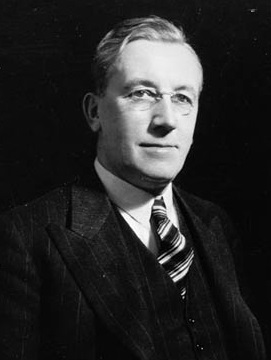M. J. Coldwell
( politician) | ||||||||||||
|---|---|---|---|---|---|---|---|---|---|---|---|---|
 | ||||||||||||
| Born | 2 December 1888 Seaton, England | |||||||||||
| Died | 25 August 1974 (Age 85) | |||||||||||
| Nationality | Canadian | |||||||||||
| Alma mater | Exeter University | |||||||||||
| Spouse | Norah Gertrude Dunsford | |||||||||||
Canadian politician. The leader of the socialist CCF party 1942-1960, he sought to suppress members pushing for withdrawal from NATO, threatening to resign if members did not support the alliance. Attended Bilderberg/1961.
| ||||||||||||
Major James William Coldwell, usually known as M. J. Coldwell (Major was his first name, not a military title), was a Canadian politician. Coldwell was of the founders of the Co-operative Commonwealth Federation (CCF) party, and national CCF leader 1942-60. In a socialist party, he sought to suppress members pushing for withdrawal from NATO. On one occasion, he threatened to resign if members did not support the alliance. He attended the 1961 Bilderberg conference.
Background
Coldwell came to Canada from England as a teacher in 1910; he stayed briefly in Alberta and then moved to Regina, Saskatchewan. He first achieved national prominence as a leader in teachers' organizations 1924-34. Also a popular alderman in Regina, he developed strong links with socialist labour and farm organizations. When the Great Depression came, he was a natural choice for leader of the new Saskatchewan Farmer-Labour Party in 1932 (which became a part of the CCF) and fought a strenuous campaign in the Saskatchewan general election of 1934, attracting enormous crowds; but the party sent only 5 members to the legislature against 47 Liberals. Himself defeated, Coldwell moved to the national scene.[1]
As MP for Rosetown-Biggar (Sask) 1935-58, he was a polished performer in the House of Commons from the first. He disagreed with Woodsworth (who was a pacifist) on [the war in 1939, and Coldwell and the majority of the CCF supported Canada's participation in WWII.[1]
He became an adherent of collective security and was a member of the Canadian delegation to the founding of the United Nations in 1945. In a socialist party, he sought to suppress members pushing for withdrawal from NATO and NORAD. On one occasion, he threatened to resign if members did not support the alliance.[2] [3][4]
He presided over both the peak of CCF support in the mid-1940s and its slow decline throughout the 1950s, leading the party in 5 general elections. His views seemed to moderate as more of the CCF's social welfare program was implemented by other governments, but he remained convinced of the need for a democratic socialist party. He was named to the Privy Council of Canada in 1964 and made Companion of the Order of Canada in 1967.[1]
Event Participated in
| Event | Start | End | Location(s) | Description |
|---|---|---|---|---|
| Bilderberg/1961 | 21 April 1961 | 23 April 1961 | Canada Quebec St-Castin | The 10th Bilderberg, the first in Canada and the 2nd outside Europe. |
References
- ↑ Jump up to: a b c https://www.thecanadianencyclopedia.ca/en/article/mj-coldwell
- ↑ https://canadiandimension.com/articles/view/nato-does-not-and-never-did-defend-democracy
- ↑ https://canadiandimension.com/articles/view/nato-does-not-and-never-did-defend-democracy
- ↑ https://canadiandimension.com/articles/view/bombs-and-waffles-the-ndp-and-nato-in-the-twentieth-century